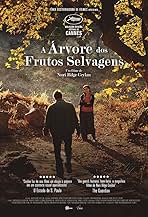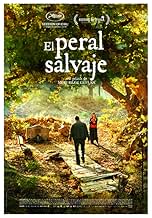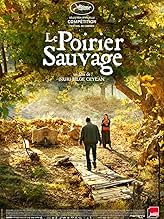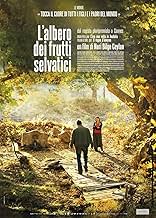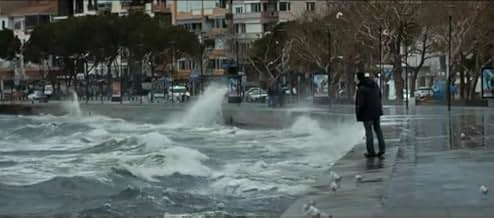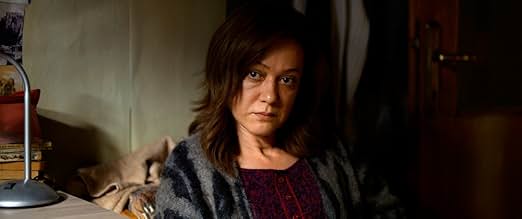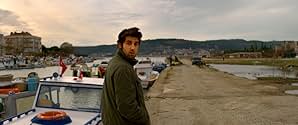An unpublished writer returns to his hometown after graduating, where he seeks sponsors to publish his book while dealing with his father's deteriorating indulgence into gambling.An unpublished writer returns to his hometown after graduating, where he seeks sponsors to publish his book while dealing with his father's deteriorating indulgence into gambling.An unpublished writer returns to his hometown after graduating, where he seeks sponsors to publish his book while dealing with his father's deteriorating indulgence into gambling.
- Director
- Writers
- Stars
- Awards
- 10 wins & 15 nominations total
- Sinan Karasu
- (as Aydin Doğu Demirkol)
- Yasemin Karasu
- (as Asena Keskinci)
- Director
- Writers
- All cast & crew
- Production, box office & more at IMDbPro
Featured reviews
It's very easy to find things from your own life within the story and the dialogues that occur which makes a lot of the little-longer-than-usual scenes very engaging and that makes you wonder how the dialogue is gonna develop and conclude.
I normally don't care too much about the length of movies but I'm a little bit on the negative side with this one. That's mainly because of what I told myself halfway through the movie which was; "Ohhh, we're only halfway" instead of "Yeahhh, we're only halfway".
It's about a young writer who recently finished university. He must move back to his village from the city where he went to school. So his struggles start as he doesn't want to get used to the village life.
This witty and beautiful film is full of metaphors, wonderful imagery and deep, intriguing conversations. The film revolves around many interesting themes. Among these themes is that ruptures in the soul should be treated with joy and patience for they help us discover who we are. The cinematography is luminous, mesmerizing and far ranging from lamp lit streets at night, rainfall and close-ups of Hatice's flowing hair. I want to linger in each place. It is a long film, but for what it reveals about contemporary Turkish society and human nature, it is a fantastic bargain and worth the price. From the director of Winter Sleep and Once Upon a Time in Anatolia. Seen at the 2018 Toronto International Film Festival.
In his first movies Ceylan barely had a story, he only had "themes". The rest of the movie was wonderful photography and this is what he got famous for. Then, founding clever collaborations, he learnt how to tell stories as well. But the question here is: does he really have a new story to tell? Turkey has changed a lot since Kasaba, but Ceylan's representations look like they are here to stay eternally. For instance, while Ceylan still hold on to the "intellectual stuck in the countryside" stereotype, intellectuals in the Turkish countryside either made it to the metropolises or they are replaced/outdated by the emerging religious elite.
So instead of telling a new story, Ceylan seems like he chose to "garnish" what he already has, with neverending dialogues unattached to each other. Dialogue with the girl, dialogue with the mayor, with the businessman, with the writer, with the police friend, with the imams and with this and this and this. Kind of a video game, one "countryside monster" at a time. So I think this movie is a rococo remake of minimalist Kasaba.
So if you tolerate the theatrical lines in the first dialogues, the movie is a nice one to see. But in comparison to the last 2 movies of Ceylan, this is certainly a step backwards (and surprisingly, this backwardness is evident also in the photography).
The plot, the acting and the cinematography is simply incredible. As a guy who lives in Turkey, it's very rare to see films with a quality. So in that way, I can easily say that Ahlat Agaci is the best movie in the past 4-5 years.
What stood out for me in the film was that you basically never get bored even though the film is quite long. No unnecessary scenes, no characters that you hate everytime you see them. Definitely a thing to consider.
NBC is so undervalued and underrated, at least in his homecountry. Interestingly enough, European cinema appreciates him and he almost always participates in Cannes Film Festival, but I'm %100 sure that half of Turkey doesn't even know his name. It's sad, but it also says a lot about the general look to cinema sector in Turkey.
Thanks to people like NBC, though, we can watch 'real' and 'non-American made' films.
Quality film by an incredible director. 10/10
Sinan Karasu is a young man who returns to his city and to his non-functional family after graduating college. The prospects of a college graduate are not too many or too attractive: either to take a teacher's exam after which he will be assigned to teach at a primary school in a remote area of Turkey, or join the army or the police. His father, Idris, is a teacher, but also a betting addict, which got him into debts, and led the family to losing the property of their house and living at the edge of a precarious existence. Idris's ambition seems to be to return to his native village, where in weekends he digs a fountain on a hillside, with little hope of ever hitting water. Young Sinan is also a writer, he wrote a book inspired by the local people and culture, but the kind of non-commercial book that finds neither editor nor reader public. The gaps between his aspirations and realities, between his ambitions and the mediocrity around are huge, and the result is a permanent conflict with a world with which he tries to entertain dialogues, but which he also approaches with a sense of intellectual superiority without foundation in social realities.
Like many other good movies (or books or other works of art), 'Ahlat Agaci' can be viewed and understood at several levels. At the personal level, the film has complex characters that we discover and we get to know better and better as we advance in the viewing, with the help the excellent acting performances of actors such as Dogu Demirkol, Murat Cemcir and Bennu Yildirimlar . There is also a political and social layer that is never explicit, maybe in order to allow the film to be easily distributed in Turkey and thus be accessible to the local audience, which is probably very important for a director like Nuri Bilge Ceylan, but also because true creators know how to convey messages without transforming their works into manifestos. Finally, there is a philosophical layer, more or less related to the main story, but which raises interesting issues such as the compromises that a writer is bound to make to gain popularity and what are their limits, or the relationship between religion and its institutions and their relevance in social life. Ceylan knows to tell a story and to film beautifully, and attentive viewers will also benefit from short moments of surreal insertions that deserve not to be missed. The film is long but in rare moments it feels so (the scene of the conversation with the two imams is the only one in which I had the impression that the cutting of a few minutes would have been beneficial), and the spectators will be rewarded at the end with one of the most exciting film finales which I have seen lately. A movie to see.
Did you know
- TriviaAccording to Nuri Bilge Ceylan, The Wild Pear Tree is about a son's unavoidable slide towards a fate resembling that of his father.
- Quotes
Sinan Karasu: When we learn we are not so important why is our instinct to be hurt? Wouldn't it be better to treat it as a key moment of insight? We engender our own beliefs. Thus we need to believe in separation as much as in beauty and love, and to be prepared. Because rupture and separation in wait for everything beautiful. In which case, why not treat these tribulations as constructive disasters that help us pierce our own mysteries.
- ConnectionsFeatures The Hopeless Ones (1971)
- SoundtracksPassacaglia and Fugue in C minor, BWV 582
Composed by Johann Sebastian Bach
Performed by Leopold Stokowski
- How long is The Wild Pear Tree?Powered by Alexa
- What was the purpose of Sinan's father by requesting him to make a guess about the money issue?
- When Sinan shows up at the horse racing dealer, he thought there was people in it including his father, then we understood that there was nobody other than his father. What did that mean?
Details
- Release date
- Countries of origin
- Official sites
- Language
- Also known as
- Cây Lê Dại
- Filming locations
- Yenice, Çanakkale, Turkey(location)
- Production companies
- See more company credits at IMDbPro
Box office
- Gross US & Canada
- $34,014
- Opening weekend US & Canada
- $4,923
- Feb 3, 2019
- Gross worldwide
- $1,696,258
- Runtime3 hours 8 minutes
- Color
- Sound mix
- Aspect ratio
- 2.39 : 1
Contribute to this page



